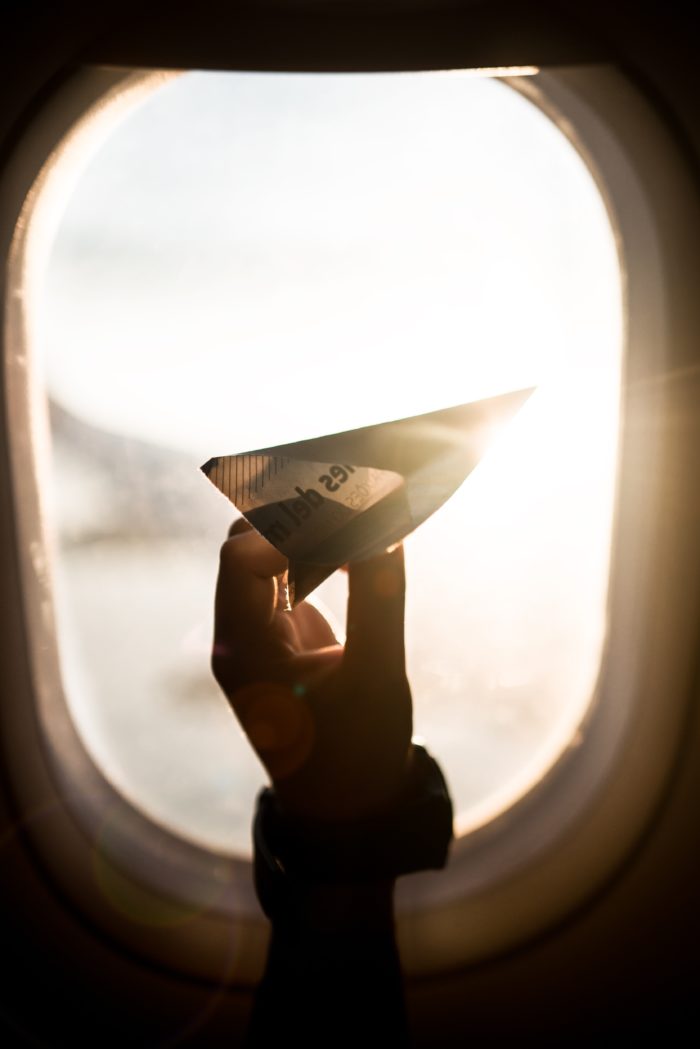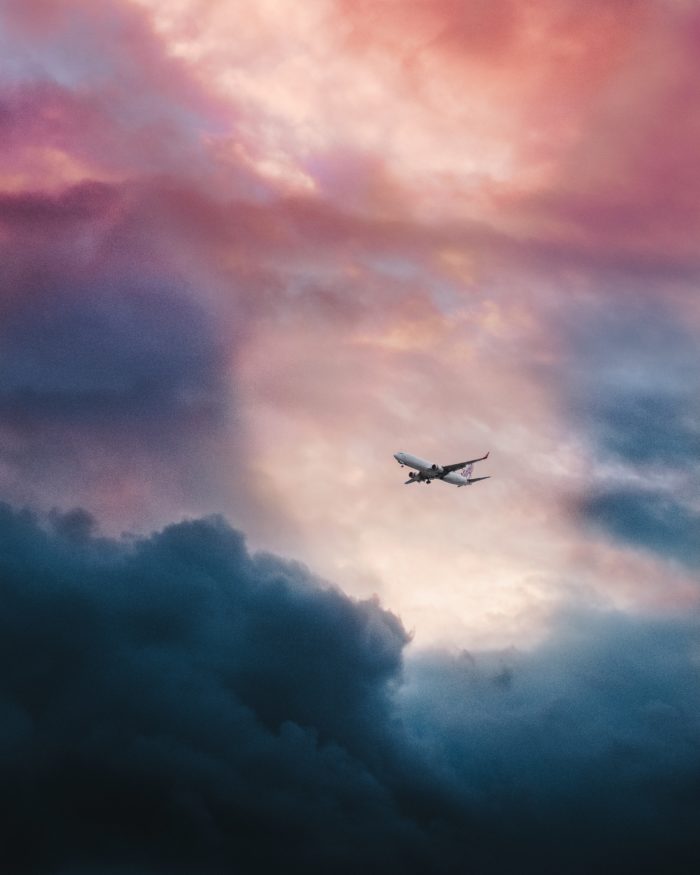“What do you feel when you think of a plane?” My therapist asked. “Like I’m going to cry,” was all I could manage saying with my already breaking voice. I could not bear the thought of flying, and I had no idea how my fear got to that point. Just 8 months ago I was booking my flight back to the United States from Mexico. In my mind, the date on my plane ticket symbolized the date of my tragic death.
From the moment I knew I was traveling again, I began to have nightmares about plane crashes almost daily. It got to the point that I was afraid of going to sleep, too. At work, I went through the motions as the main focus of my thoughts was the image of a plane, imposing and daunting. My heart rate went up at the thought of flying, and my eyes filled with tears randomly throughout my days. On previous flights, I often felt as if I was about to faint while standing in line for boarding. By spring of last year, I could not remember what it was like to travel without anxiety. I missed my old self, the girl that lived for days spent at airports, going on exciting adventures.
I decided to seek therapy, and learn to manage my anxiety because I refused to give up travel out of fear of planes. I was a psychology major in college, so at this point I could recognize that I had developed a phobia. A phobia is very different from a fear. Fear is a normal reaction to a dangerous situation. But a phobia is “an extreme fear or dislike of a particular thing or situation, especially one that cannot be reasonably explained.” (Cambridge Dictionary) Phobias provoke such a state of anxiety you may feel nauseous, dizzy, shaky, and even vomit or faint when confronted with the thing that is feared (in my case, airplanes). If you think about the reported number of plane crashes versus the number of deaths caused by car accidents, it seems silly to associate our last days on Earth with booking a flight.
Each therapy session (I had 4 in total) allowed me to pinpoint when my fear developed and locked into my brain. According to goodtherapy.org, phobias often develop after a traumatic childhood experience. When I was 13 years old, I flew to the United States alone; my parents were waiting for me at the Miami International Airport. It was 2002, and we were seeking a better life as the political situation in Venezuela worsened. There was a hail storm, and we had to do an emergency landing in the Bahamas. By the time we landed in Miami, the plane completely shut off, seemingly falling off the sky. Thankfully we were so close to the ground, it only felt like a trampoline jump. At the time, I was more preoccupied with the grief of leaving my friends and family behind and not knowing when I would see them again (17 years later, and I still have not been back to Venezuela, but I have seen many family members abroad).
As the years passed, I became a frequent traveler. I flew to annual youth group events across the country all through high school and college, and went on vacations to places as far as Japan. I became so passionate, I started a travel blog. I also experienced long flights related to grief and sorrow. I was scared to death when I flew from Miami to Los Angeles to visit my dying father. I was completely heartbroken when I flew back to Miami after watching him pass away. I was excited and terrified when I decided to move to Madrid all by myself; two years later, when I left Spain to move to Mexico, I had no job and no concrete plan. Though I was excited and madly in love in my new relationship, I was also grieving the loss of life in Madrid, a city I still think of as a home.

My therapist helped me create a timeline of all the flights I had taken since 2002 (when I left Venezuela) and how I felt in each of those flights. I began to connect the dots. While there were many exciting flights that took me to beautiful vacations around the world, there were many long flights I took by myself where I was grieving something or someone. Unknowingly, the association of planes and grief was linked together in my mind, weaving a thread of anxiety and panic each time I booked a flight somewhere.
One of my favorite therapy exercises was drawing on a piece of paper. On one side, I drew all the things that worry me in life: finance, having a place to live, being able to take care of my mom in the future, etc. On the other side, I drew all the things that bring me joy: my friends, the sea, hiking, my partner, coffee, my mom, etc. My therapist allowed me to see that all the things that cause me worry are things I have control over. Whatever happens, I have the physical and mental abilities to provide for myself and others. And many of the things that make me happy are pretty much a given, “The mountains and the beaches will be there for you to visit, whether you exist or not,” my therapist said. It was suddenly obvious to me that I have 100% control over my response to airplanes and flying.
The most significant and final point before concluding my 4 sessions was realizing that when I get on an airplane, I tend to focus on what I am leaving behind. In the most painful of experiences, flying somewhere has been about leaving a place I thought of as home, saying goodbye to loved ones, and not really knowing when I will return to those places or see those friends and family again. But therapy helped me understand that I needed to begin looking to the future. Associating my flight with the place I am going to, the people I will see there, the things I will do there.
As I prepare for my flight from Mexico City to Houston this week, I am excited and have not had a single nightmare in the two months since I bought the ticket. It has been 7 months since I completed my 4 therapy sessions. I cannot say anxiety has not crept in some days. There are moments where the thought of a plane crash crosses my mind. Rather than expanding on the tragic imagery my brain is suddenly creating for me, I think of something else. Looking to the future and giving myself a purpose for each stage of my trip has been a breakthrough in my anxiety, and understanding where the fear originated has made me think more rationally of the situation. For this flight I am going to take some me-time to listen to an episode of my favorite podcast I have not had the time to truly listen to. And there is a face mask in my carry-on waiting to be used as soon as I arrive in my hotel room. These little tasks help me build up a sense of excitement, and something more positive to focus on.
I plan on bringing back the girl that rode a plane with the fearless intention to live her best life traveling the world! That was me, and it will be me again. I am taking it one flight at a time, and so far I am experiencing a level of excitement I had not felt in a while when traveling. If you read my article on how to manage flight anxiety, you know I have a few tricks to make my in-flight experience more pleasurable and peaceful. But what therapy has done for me is not just about the in-flight experience. Therapy has allowed me to find the resources (within my own mind and heart) to create a more tranquil and happy life experience as I keep enjoying every wonderful place this world has to offer. Truth be told, I am going back for more sessions next month. Ultimately, therapy many not give you a solution to your problems, but it will give you the resources to live your dream life as the best version of yourself possible. And who doesn’t want to make the most out of their time on Earth?

Also by Vanessa: What It’s Really Like To Live As An Expat—aka, What Instagram Doesn’t Show
What Living In Spain Taught Me About Eating, Living & Savoring Every Moment
Get more like this—Sign up for our daily inspirational newsletter for exclusive content!
__
Photo: Leio McLaren , Sebastián León Prado , Ian Simmonds




